Rabium-DSR
Rabium-DSR consists of Rabeprazole (an acid suppressant) and Domperidone (a nausea and vomiting reducer). Together, they reduce the amount of stomach acid generated, as well as the sensations of nausea and vomiting. It is utilized to treat acid reflux owing to hyperacidity, stomach ulcers (Peptic ulcer disease), and Zollinger Ellison syndrome (overproduction of acid due to a pancreatic tumor). Aside from that, what is used to treat short-term symptoms of gastroesophageal reflux disease? (GERD).
Too much stomach acid irritates and damages the sphincter (valve) at the top of the stomach, causing GERD. Consequently, stomach acid and juice return to the esophagus, creating pain and heartburn. Heartburn is defined by a burning feeling that rises from the stomach to the neck and is caused by acid reflux.
Rabium-DSR consists of two different drugs: Rabeprazole and Domperidone. Rabeprazole is a proton pump inhibitor that reduces stomach acid by inhibiting the activity of an enzyme (H+/K+ ATPase or gastric proton pump). This gastric proton pump is located in the cells of the stomach wall and is responsible for the secretion of gastric acid, which damages the esophagus, stomach, and duodenum (uppermost part of the small intestine). Domperidone, on the other hand, is a prokinetic medication that increases the motility of the upper gastrointestinal tract while inhibiting the vomiting center (chemoreceptor trigger zone-CTZ).
Rabium-DSR is most effective when taken an hour before or after a meal. Rabium-DSR should be consumed whole with a glass of water. It must not be eaten, fractured, or crushed. Continue taking this medicine for as long as your doctor instructs. If you discontinue your medicine prematurely, your symptoms may return and your health may worsen. Adults commonly experience headache, diarrhea, nausea, stomach discomfort, vomiting, flatulence, dizziness, and arthralgia when using Rabium-DSR (joint pain). Children on Rabium-DSR have suffered upper respiratory tract infections (URI), headache, fever, diarrhea, vomiting, rash, and stomach discomfort. Typically, these side effects are transient and resolve with time; however, if they continue, visit your doctor.
By consuming frequent little meals or snacks, it is possible to enhance the effectiveness of Rabium-DSR. All of the following should be avoided: caffeinated beverages (coffee, tea), spicy/deep-fried/processed meals, carbonated beverages, and acidic foods (citrus fruits/vegetables) (tomatoes). Inform your doctor if you have stomach or intestinal cancer, a liver ailment, an allergy to Rabium-DSR, or an upcoming endoscopy. Rabium-DSR may cause vitamin B-12 insufficiency as well as low calcium, magnesium, and vitamin D levels, which can lead to osteoporosis (brittle or weak bones).
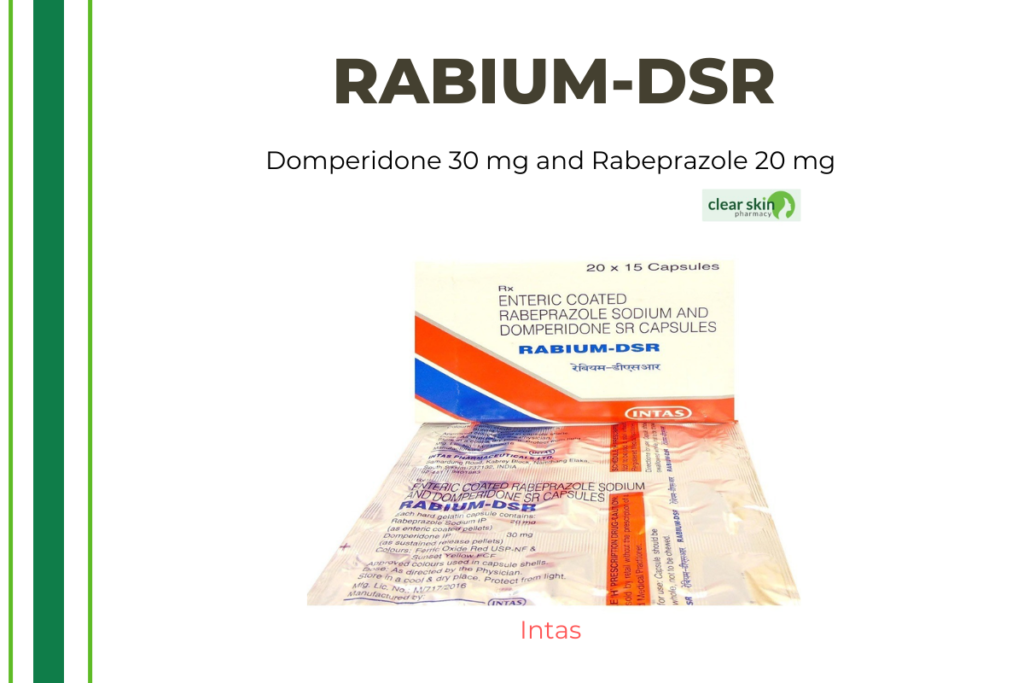
Rabium-DSR Applications
Dyspepsia, Gastro-Esophageal Reflux Disease (GERD), GERD (stomach discomfort due to indigestion)
Medicinal Advantages
Rabium-DSR assists in stomach excess reduction. As a result, it inhibits the formation of a duodenal ulcer in the upper intestine, gastroesophageal reflux disease (GERD) with or without ulcer, and Zollinger-Ellison Syndrome, a condition in which the stomach generates too much acid. Rabium-DSR is also used to treat nausea and vomiting in adults and older children. (at least 35 kg or more).
Use Instructions
Rabium-DSR should be administered one hour before to a meal. Rabium-DSR should be consumed whole with a glass of water. It must not be eaten, fractured, or crushed. Rabium-DSR is now available in liquid form for those who cannot swallow pills or capsules. Do not take Rabium-DSR for more than four weeks without consulting a physician.
Storage
Place in a cool, dry area out of direct sunlight.
Rabium-DSR Side Effects
Each medication has its own harmful effects. Rabium-DSR has a number of frequent side effects. Rabium-DSR may cause rashes, brittle bones, low vitamin B-12 levels, loss of libido (sexual desire), cough, sore throat, runny nose, flatulence (gas creation), back discomfort, weakness or lack of strength, insomnia, headache, dizziness, and benign polyps of the stomach in adults. Typically, these side effects are transient and resolve with time; however, if they continue, visit your doctor.
Drug Recommendations
You should avoid taking them if you are allergic to Domperidone and Rabeprazole or proton pump inhibitors, have stomach cancer, liver disease, low magnesium level (osteoporosis), low vitamin B12, are pregnant or intending to become pregnant, or are nursing. Domperidone and Rabeprazole may interact with a blood thinner (warfarin), an antifungal (ketoconazole), an anti-HIV medication (atazanavir, nelfasvir), iron supplements, ampicillin antibiotic, and an anticancer agent (methotrexate). Inform your physician if you are taking any of the drugs listed below. The combination of Domperidone and Rabeprazole can cause lupus erythematosus, vitamin B-12 insufficiency, and magnesium deficit with long-term use. Domperidone and Rabeprazole may mask the signs of gastric cancer, therefore seek immediate medical attention if you have severe stomach pain or gastric bleeding (blood in mucus or stool). Before undergoing a blood test for Chromogranin A, notify your doctor of any medications you are taking.
Interactions Between Drugs
Antifungals (ketoconazole, voriconazole, itraconazole, fluconazole, posaconazole), anti-HIV drugs (atazanavir, amprenavir, nelfinavir), antacids (magnesium hydroxide, aluminum hydroxide, cimetidine), iron supplements, antibiotics (clarithromycin, erythromycin, ampicillin, rifampicin), blood thinners (clo (aprepitant).
Drug-Food Interaction: The antidepressant St. John’s wort plant interacts with Domperidone and Rabeprazole. This plant may interact with Domperidone and Rabeprazole. Therefore, it must not be used with Domperidone or Rabeprazole.
Domperidone and Rabeprazole should be avoided in individuals with C. difficile-induced colitis, liver disease, bone fractures, low Vitamin B12 (anemia), or low magnesium (hypomagnesemia).
Safety Suggestions
ALCOHOL
Consuming alcohol while taking Domperidone or Rabeprazole may result in dehydration and an increase in stomach acid levels, so diminishing the medication’s efficacy. Try to avoid Domperidone or Rabeprazole, minimize your alcohol consumption, or see a physician before using these medications.
PREGNANCY
Uncertainty exists as to whether Domperidone and Rabeprazole have any effect on the newborn. Consult your doctor before using Domperidone or Rabeprazole. Before prescribing it to you, your physician will weigh the benefits and potential risks.
BREAST FEEDING
Domperidone and Rabeprazole, which both include Domperidone, are excreted in breast milk. However, there is no evidence of a danger. Consult a doctor before using Domperidone or Rabeprazole. Before prescribing it to you, your physician will weigh the benefits and potential risks.
DRIVING
Some individuals using Domperidone with Rabeprazole may experience vertigo, drowsiness, or blurred vision. If you have these symptoms, do not drive or operate heavy machinery until you feel better.
LIVER
Consult your physician before to using this medication if you have a history of or symptoms of liver-related diseases.
KIDNEY
Consult your physician before to using this drug if you have a history of or signs of renal difficulties.
No habits formed
Advice on Diet and Lifestyle
Avoid foods and beverages that trigger acid reflux or heartburn, including onions, peppermint, chocolate, caffeinated beverages, citrus fruits or juices, tomatoes, and high-fat, spicy cuisine.
Don’t drink alcoholic beverages or smoke cigarettes. Alcohol can induce heartburn and acid reflux by stimulating the formation of stomach acid. In contrast, nicotine smoking inhibits the valve (sphincter) that prevents stomach acid from flowing back into the food pipe.
Long durations of sitting might increase stomach acid production. Take a 5-minute break every hour to walk or stretch vigorously.
Before going to sleep, try to elevate your bedhead so that your head and chest are higher than your feet. A single raised block will serve in place of stacked pillows. This will prevent stomach acid from entering the food supply.
Include foods high in fiber in your diet, such as berries, cherries, leafy green vegetables (kale, spinach), and black pepper. These foods are rich in antioxidants, calcium, and vitamin B 12, which can help you manage the long-term effects of the medicine. Fermented dairy products, such as miso, sauerkraut, and kimchi, include probiotics that assist in reducing excessive stomach acid production. Cranberry juice can help both peptic ulcers and H. pylori infections.
Recommendations
Do not use Domperidone with Rabeprazole for more than four weeks without consulting a physician.
Additional information: This item is non-refundable.
Concerns of Patients
Typically, a thick coating of mucus protects the stomach from its own acid production. In contrast, excessive stomach acid production erodes it over time, producing in conditions such as GERD, peptic ulcers, and Zollinger Ellison syndrome. Gastroesophageal reflux disease (GERD) is a gastrointestinal disorder in which stomach acid refluxes often into the esophagus (oesophagus). Acid reflux (backflow) causes heartburn by irritating the esophagus. In contrast, peptic ulcer is a painful illness that creates sores or ulcers in the stomach lining or duodenum (the first portion of the small intestine) (the duodenum). The Zollinger Ellison syndrome is a rare illness in which a gastrin-secreting tumor in the pancreas produces an excessive quantity of acid, resulting in peptic ulcers.
FAQs
Domperidone and Rabeprazole prevent the overproduction of stomach acid that causes acid reflux and discomfort. Consult a physician immediately if you find blood in your feces or mucous.
Dry mouth is an adverse effect of domperidone and rabeprazole, and domperidone is the reason. If you experience extreme thirst, increase your fluid consumption and rinse your mouth often.

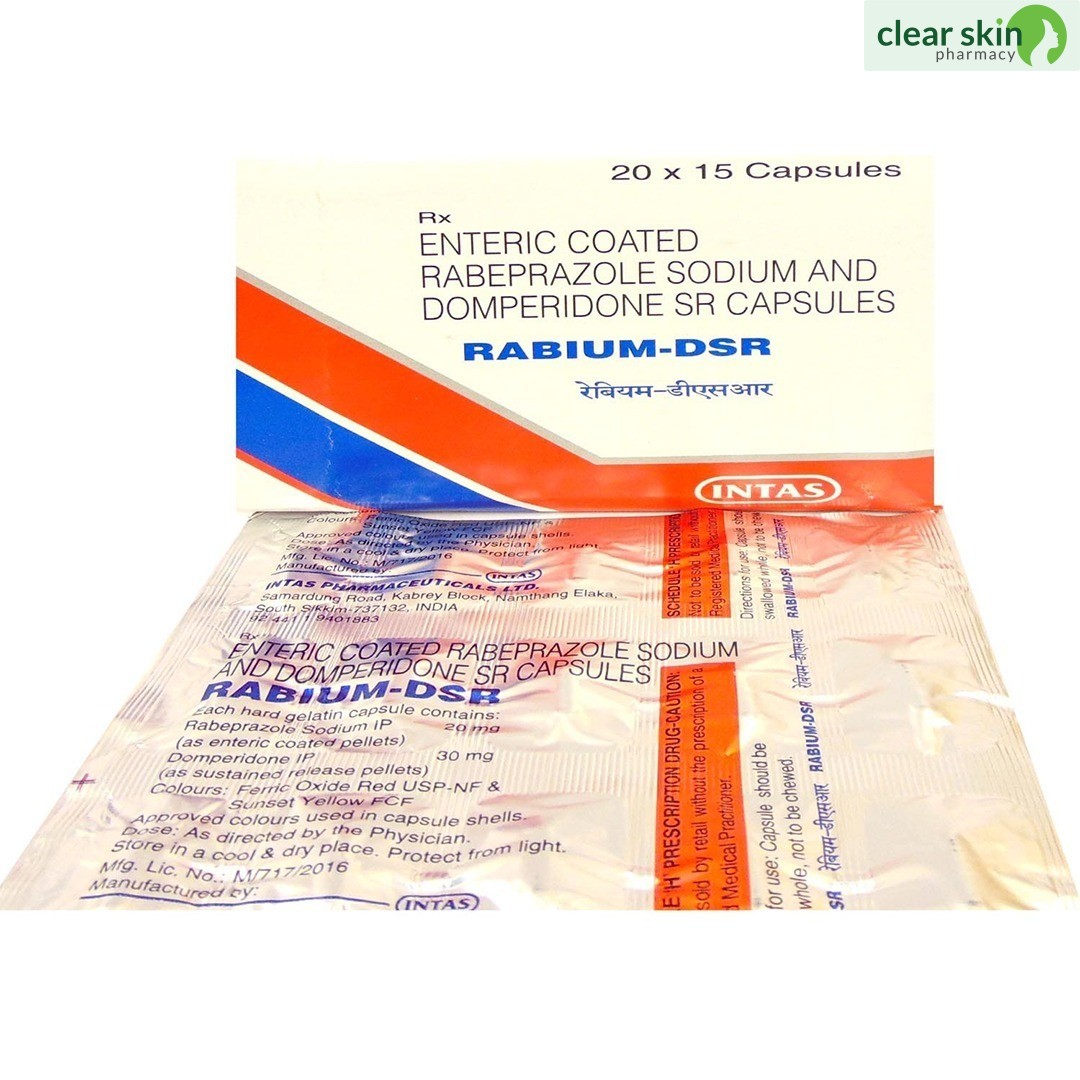
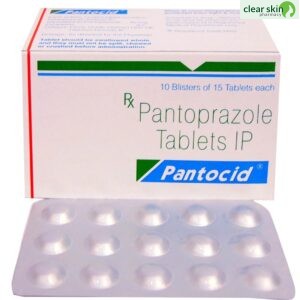
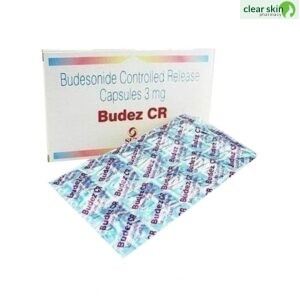
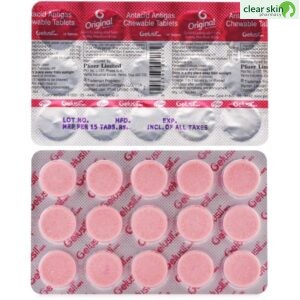

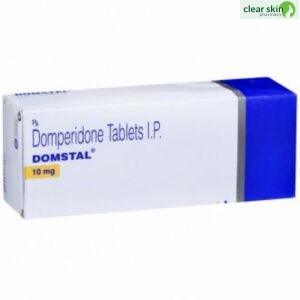
Be the first to review “RABIUM-DSR 15 Tablets”